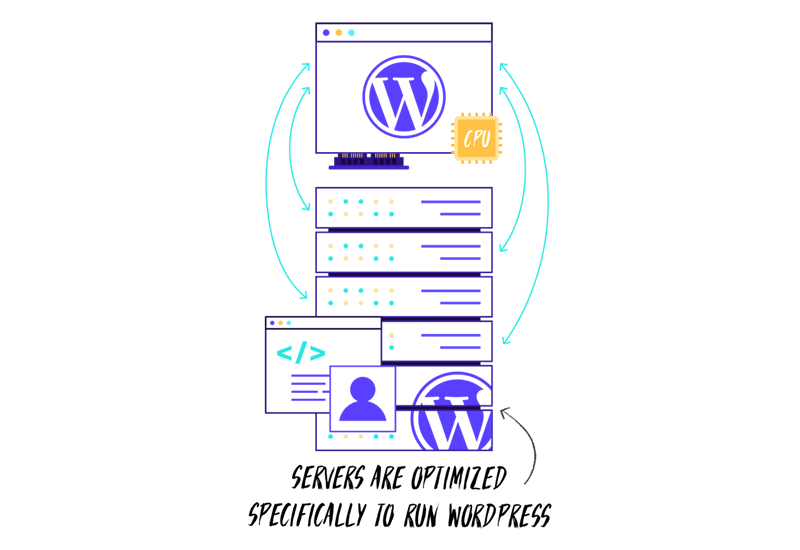
Deciding what type of web hosting is best for your WordPress website can be a complicated task. There are a ton of articles, posts, and more out there that for the most part probably just add to the confusion! To help, we’re going to focus on the most common options available to you for your WordPress website.
We will provide an overview of Shared Web Hosting, Managed WordPress hosting, and VPS hosting. By the end of this article, we hope you better understand the types of hosting available and, most importantly, are clear on what is best for you!
Regardless of the size of the website, the type of hosting used can make all the difference in how it performs. If your site is running slowly and you’re getting reports of customers struggling to access your site, then keep on reading.
Hosting matters most, but your actions matter too.
📝 Get the Client-Side Optimization Quick Wins free checklist to apply the basics today.

The majority of hosting available today is of the ‘Shared Hosting’ type. As the name suggests, multiple websites ‘share’ a server for their hosting.
When hosting your website on a shared server, you and all the other accounts on the server, often referred to as “neighbors,” share its resources, including disk space and I/O operations, databases, RAM, CPU, and network.
This has one major upside but multiple downsides.

The main advantage of shared hosting is, of course, the cost. As we said, the resources available on a server are distributed between many users which means the cost is evenly distributed as well. And because there are so many web hosting companies on the market, there is strong competition, which makes shared hosting services even more inexpensive. That makes Shared Hosting available to anyone with any budget.
On top of that, Shared Hosting is normally easy to manage making it suitable regardless of your level of expertise. Depending on the provider you might find it also comes with tools that allow you to do things like take a backup of your website, clone it to another domain, install an SSL certificate, and so on. Most shared hosts now also include a “one-click” WordPress install.
Depending on your level of expertise, you can also take advantage of the more sophisticated functionality offered. Most commonly, shared hosting providers provide cPanel or Plesk which are admin panels designed for managing websites. You can use the advanced tools provided by these systems to undertake work on the database, access log files, and a whole lot more.
Regardless of the price, most shared hosting plans offer some form of customer support as well. The support quality will definitely vary (you do get what you pay for!) and there will be no guarantee of response times or the level of technical expertise offered by the support team. If support is what you really need you might be better off looking at more expensive hosting options (read on). However, most shared hosts will help with basic technical issues and any problems you might encounter with their hosting service.
So, now that we’ve reviewed some of the upsides of shared hosting let’s take a look at the downsides (be warned, there are plenty!).
Shared hosting drawbacks include performance impact from other users, limited resources, security risks from neighboring sites, lack of customization, and potential resource abuse. Let’s expand on the most important ones.
The first downside with most shared hosting plans is performance. Imagine you opened your laptop. First, you opened some documents, then fired up a couple of other programs (like Photoshop). You fancy some music so load Spotify and to round things off open your web browser which has about 100 tabs saved on it! What do you think is going to happen? Unless it’s a really high-performance bit of kit, it’s going to run really slowly. Or perhaps crash. And this is exactly what happens with so many websites hosted on overcrowded shared hosting. They run slowly or don’t run at all.
The next problem is security. Apart from WordPress itself, the underlying server software needs to be up-to-date to remain secure. But with a lot of “neighbor” websites, yours will always be more vulnerable to hacking by association. It’s a bit like you locking the front door and setting the alarm at home but not realizing that one of the kids has left a window open at the back of the house.
The next issue on the list is support. Now, unless you’re really lucky, at some point something will probably go wrong with your website. It’s at this juncture that you can really notice the difference between budget and premium hosts.
When it comes to more complicated websites or with higher traffic, you will need a better support team response. You need a bigger support team with members of expertise, in order to respond quickly.
More specifically, with potentially thousands of support tickets flooding into hosts on a daily basis you need a lot of staff to answer them on time. Not only that, but you need well-trained staff who know their subject matter (in this case hosting and WordPress inside out). Well, guess what… for $20/year you’re simply not going to get the quality of support you need, no matter what a host might say. The economics of running a high-quality support desk just doesn’t stack up for budget hosts.
So, in summary, you really do get what you pay for and, when it comes to cheap shared hosting, you don’t get a lot.
Struggling with Hosting Performance? Follow these steps:
1. Download our free checklist to evaluate your provider’s performance capabilities.
2. It might be time for a professional checkup. Discover how your website can perform at its best with our free performance audit. Click below to get started and ensure your site runs smoothly and efficiently.

Managed WordPress Hosting (MWH)
Let’s move on to another popular type of WordPress hosting called ‘Dedicated’ or ‘Managed’ WordPress hosting. This type of hosting typically costs more. Instead of $20/year, you will be looking at more like $20/month per website. So, why the massive (in percentage terms anyway) cost increase?
Well for starters, managed WordPress hosts will likely use higher-quality servers. Instead of cramming 1,000 websites onto each server, they might only put 50 onto each. From a cheap, overcrowded server, you go to one that is much more powerful with fewer demands placed on it.

Next, managed WordPress hosts tend to specialize in WordPress. This means they will optimize the underlying software that runs the server to better suit WordPress. This means your WordPress website will load much more quickly and run much more smoothly.
What does MWH focus on?
Managed WordPress hosts prioritize security and place significant emphasis on designing server architecture. This way all websites are more securely separated, preventing breaches from spreading between them.
Next up is support. Managed WordPress hosts will normally do a much better job of providing technical support to their customers. Because they charge more they can afford to invest in a decent support team that knows what they’re talking about. There will come a day when you’re relieved to find this is the case!
Finally, Managed WordPress hosts will often provide a range of additional tools that can make your life as a website owner much easier. These might include fully automated backup solutions, staging servers, free migration, customizable and automated WordPress core updates, and so on.
But despite the great features that come with MWH, there are also some potential downsides to consider.
Starting with the obvious… cost. While the upsides of Managed WordPress Hosting are significant, it may not be affordable for everyone.
Your control over the server may also be limited. In the name of improving security, a Managed WordPress hosting platform may not be compatible with some plugins or themes you are using. They may even ban them for specific reasons, as we do in Pressidium. So, you may end up unable to use some of your favorite plugins or themes.
In addition, access to the server or database is often limited. This can be frustrating if you have technical expertise and want more control over the backend.
VPS Hosting
A VPS, or virtual private server, is a type of cloud hosting that exists within a parent server on cloud infrastructure. That means that a physical server is divided into multiple isolated virtual servers with each of these hosting one client/user.
Because of how this is designed when a website is hosted on a VPS, it will make use of its own dedicated resources (that have been pre-allocated) such as disk space, databases, RAM, CPU, and so on. It will also run its own operating system and software. This means it runs as if it is a dedicated server (i.e. a server that has only one user/client) but in fact, it’s still strictly speaking ‘shared’.
NOTE: On Dedicated hosting all the hardware resources are allocated to a single customer. This means you have complete control over the server environment, CPU, RAM, storage, and bandwidth.
VPS Hosting Benefits
VPS hosting normally does a great job of combining the upsides of a dedicated server with that of shared hosting. Let’s look in more detail at the pros and cons.
Since your website exists in an isolated environment, you have the freedom to undertake any customizations needed such as installing and configuring any software that you see fit to use. And because you are using your own resources, it you won’t be affected by what your neighbors on the server are up to (because you have been allocated a pre-defined level of RAM, storage and so on).
A VPS plan also allows you to increase or decrease the resources available to you on-demand without any interruption to your service. This can be super useful if you’re expecting a spike in traffic, for example around holiday shopping periods.
NOTE: On-demand scaling, of course, is limited to the physical constraints of the server and may increase the costs.
Overall, with VPS hosting you’ll have more control and flexibility over your websites compared to a shared or managed WordPress hosting plan.
Finally, when it comes to cost, although more expensive than shared hosting, a VPS server is normally much cheaper than a dedicated server.
VPS Hosting Drawbacks
Great features always come with a cost, whether it is money or time (or both).
Hosting your websites on a VPS involves a learning curve even if you are already familiar with system administration as you are normally the only one responsible for both your server and website management. You will have to configure the server environment yourself. Install and configure all the applications, manage security, and troubleshoot server issues. All of this can be very time-consuming as well as stressful when things don’t go to plan!
And finally, we get to the price. Whilst a VPS server costs less than a dedicated server, it definitely will be more expensive than shared hosting (and in many cases managed hosting), especially when you factor in the time cost as well. It is more expensive than Shared hosting.
Choosing the right hosting solution is pivotal for your WordPress site’s success. To further explore hosting options and performance strategies, consider the following resources:
See Also
- 10 Reasons Why Managed WordPress Hosting is the Best for Your Small Business
- How Reliable WordPress Hosting Saved This Designer’s Small Business
- 8 Questions You Should Ask a Web Host Before Purchasing WordPress Hosting with Them!
For a structured approach to optimizing WordPress performance, including insights on testing, server tuning, and advanced strategies, read our full WordPress Performance Optimization Guide online. No downloads or email required. Just free in-depth content.
Let’s answer some quick questions to further help you decide what type of hosting is best for you.
Yes, shared hosting is recommended for a beginner’s website. It is cost-effective and easy t get started with. You will have access to a control panel and pre-installed software for website management. However, you should consider the limitations in terms of performance and resource availability due to sharing resources with other websites. In addition, the quality of support is likely to be less than impressive.
When does it make the most sense to use a VPS?
A VPS could be a good choice for businesses and individuals who want more control over their hosting environment with a balance between cost and performance when dedicated resources, scalability, customizability, and root access to the server are required.
What is the difference between managed WordPress hosting and regular hosting?
Managed WordPress Hosting is geared, as the name implies, toward WordPress. This means the underlying configuration of the servers used has been optimized for WordPress. In addition, WordPress-specific tools may be provided that help make running and maintaining a WordPress website easier. Managed WordPress hosts typically take care of core security updates on your website(s) and have systems in place (such as firewalls) to help protect against hackers. In addition, support is normally superior with support teams able to help with WordPress-specific hosting issues.
Conclusion
As with most things in life, you do get what you pay for. If you just fancy spinning up a quick blog and don’t rely on your website for your livelihood, then ‘cheap and cheerful’ shared hosting makes a lot of sense. But, if performance and security matter then you may be better off looking at a VPS or Managed WordPress Hosting.
Start Your 14 Day Free Trial
Try our award winning WordPress Hosting!


















